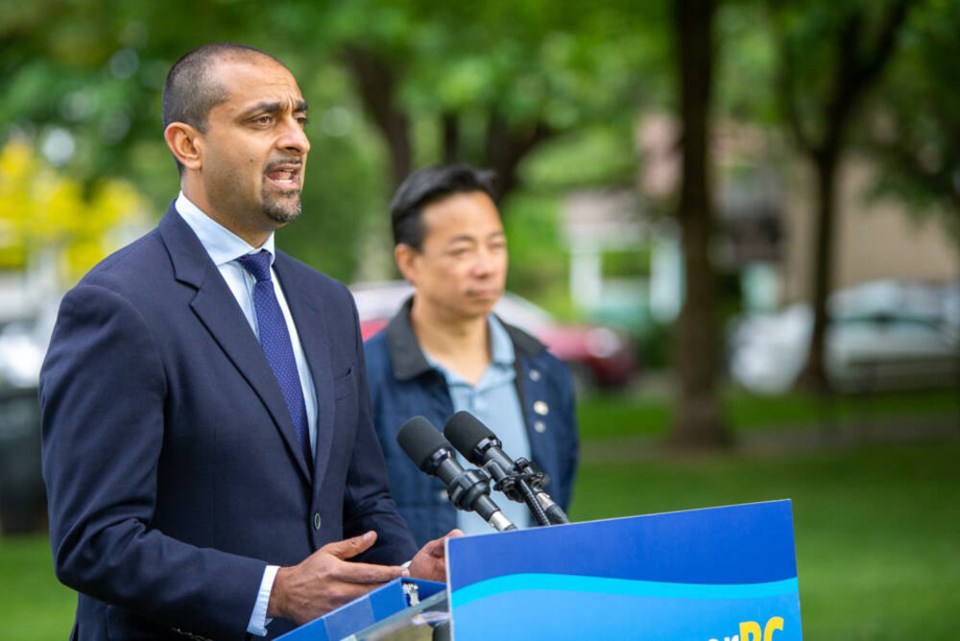Two of the three North Shore municipalities haven’t been building enough new homes, the province says, so the Ministry of Housing will be setting new targets for them.
The District of North Vancouver and District of West Vancouver are among the 10 municipalities in B.C. named by Housing Minster Ravi Kahlon at a press conference on Wednesday. Others on the list include Victoria, Delta, Oak Bay, Abbotsford, Kamloops, Saanich, Port Moody and Vancouver.
“While housing affordability is a challenge in communities across British Columbia, we selected these municipalities on an objective, thorough and measured process that factored in housing availability, affordability and unrealized potential in delivering more homes for people,” said Kahlon, noting housing experts and economists were consulted in making the list.
In 2022, the government passed the Housing Supply Act, allowing the government to set development targets for municipalities. Those exact targets will be made public later this summer.
“We need all communities to be participating in that work, and I expect most communities will be co-operating fully with this,” said the minister, noting the government can bring in an independent advisor after six months to determine where barriers exist for a municipality to reach a target. “And if we find that progress isn’t being made, then we have the ability as a province to step in and make the decisions we believe are necessary to ensure affordable housing in communities.”
North Shore mayors skeptical
While some mayors on the list welcomed the province’s announcement, the affected North Shore mayors have been more skeptical.
District of North Vancouver Mayor Mike Little said he was not surprised to see his municipality on the list, given previous discussions they’d had with the province.
According to CMHC data, the district had 6,044 housing starts between 2013 and 2022, 4,722 of which were in new apartments. About one sixth were for new single-family homes.
Little said they don’t yet know the details of how many new homes the district will be expected to approve, but he said he will make sure their meetings the province are as much about providing infrastructure that must accompany growth.
“I don’t see us moving forward without the commitments for transportation infrastructure,” he said.
Because of the price of new units coming in at the highest end of the market, Little said it would be “absurd” to believe new housing will impact affordability.
“If you wanted to actually produce enough supply to start to bring the average prices down in North Vancouver, you’d have to build tens of thousands of units. We’re building more units than we built in the last 30 years and the prices still keep going up and up and up and up,” he said.
Little said if we want to reduce traffic by repatriating the workforce with housing options, it will require significant “per-door” subsidies from B.C. Housing.
“Otherwise, they’ll continue to commute from further away and we’ll just continue to attract the premium buyer, which is not in our best interest,” he said.
Little added most of the red tape that slows down development is at the provincial level, including building, electrical and fire codes and environmental regulations.
There are dissenting opinions on council, however. Coun. Catherine Pope said she agrees with the need to update infrastructure but she stressed the district takes far too long to get new homes through the regulatory process. Pope said there is a proposal to rebuild the aging Lynn Valley Legion with housing for seniors and healthcare workers, but it is stuck in the planning department.
“We have a housing crisis. We need to find ways to make this happen faster so we can build more houses faster, and I commend the province for giving us the push that’s needed to look at this differently.” she said.
Whether North Vancouver builds more housing or not, the province still has an obligation to deal with congested bridges, Little said. Even on weekends, the bridge is over capacity as visitors drive over for the day, he noted.
“I can’t build my way into solving that issue,” he said. “It really has nothing to do with the housing supply in North Vancouver.”
West Vancouver reacts
West Vancouver Mayor Mark Sager said it’s too soon to say what will be expected of his municipality, but he echoed the same sentiment as Little – the need for infrastructure to support housing growth. Already, West Van is a thoroughfare for Sea to Sky commuters and recreational traffic, he noted.
“I’m going to hold judgment here until we see what the benefits might be for our community,” he said. “I think constituents may be concerned. And we can have concerns as well. That’s natural. But I think the devil is going to be in the details here.”
According to CMHC data, West Vancouver had 2,285 housing starts between 2013 and 2022, but more than half – 1,313 – were for new single-family homes. In the last 10 years, West Vancouver has averaged 108 new apartment unit starts per year.
“West Vancouver hasn’t had a lot of new housing in the last while. It’s the same with Oak Bay, we’re very settled communities,” Sager said. “We’re locked in by the ocean. We’re locked in by the mountains. We’ve got physical constraints.”
There will be a lot of new housing coming with the pending approval of Cypress Village – a new mixed-use village centre to be built off Cypress Bowl Road, he noted.
As for the prospect of West Vancouver council losing authority over land use and development decisions? “That would be grounds for a good fight,” Sager said.
With files from Mike Howell, Vancouver is Awesome



